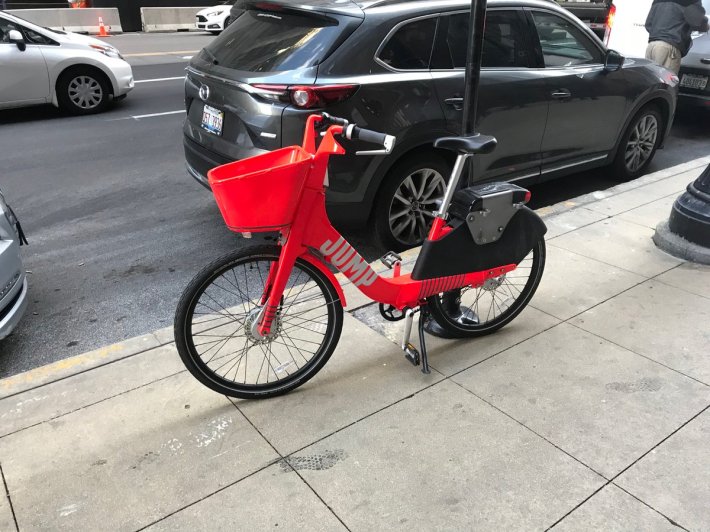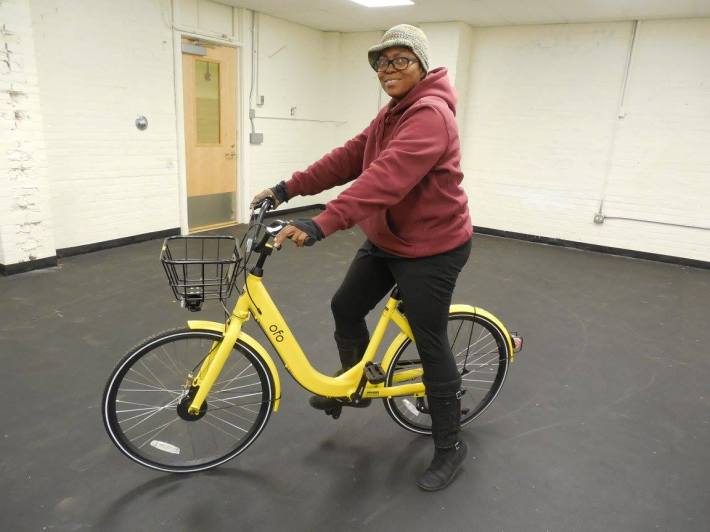The dockless bike-share trend continues to pick up speed in cities around the country. This new technology allows customers to use a smartphone app to locate and check out bikes distributed around a city, then lock them up right at their destination, with no need for the rental company to invest in pricey docking stations.
Some argue that dockless bike-share, aka DoBi is the wave of the future that Chicago should embrace, or else our city will no longer be a national leader in promoting cycling. They note that the cheap price of renting the bikes, usually $1 per half-hour compared to $9.95 for a Divvy day pass, and the convenience of not having to end a trip at a station, can help attract more people to urban cycling
Others point out that DoBi cycles are generally lower quality than traditional bike-share vehicles, and good maintenance of the bikes isn't guaranteed. They're typically left "free-locked" on the sidewalk, so it's possible for them to pose a pedestrian hazard, and they're easy to steal or vandalize. Moreover, there are signs that the Chinese dockless industry is hitting a major speed bump.
One person who's uniquely qualified to weigh in on the subject is Randy Neufeld, who helped found the Active Transportation Alliance more than 30 years ago, served as its director for many years, and currently heads the SRAM Cycling Fund, which provides grants for bike projects around the world. He shared his thoughts on what Chicago should do about regulating dockless bike-share companies, who have recently been courting the city.
"I don't buy that dockless systems are cheaper [to run] than docked systems," Neufeld says. "They are cheaper if you use crap bikes and don't rebalance and maintain the bikes," he says. "It's true that you don't need a dock but with [electrical-assist bike] systems, the dock may be cheaper than figuring out another way to charge free-floating bikes. Managing the helter-skelter bikes has a cost. Putting the brains on each bike has a cost as well. Rebalancing is essential to a good system, and the dockless technology only marginally helps."

Neufeld notes that all of the early European public bike systems, such as Amsterdam's 1960s-era white bicycles program, were dockless, but they weren't sustainable due to issues of street clutter, theft and vandalism. (Notably, Amsterdam has banned modern DoBi technology.) "Docks evolved to solve the problems of security, reliability and clutter with dockless systems," he says. "Mostly it was security. I don't know why people like to throw bikes in canals, but it is still a big problem. It was the solving of those problems that caused bikeshare to really take off starting with Velib in Lyon, France, in 2007." Neufeld argues that many of the shortcomings of the original dockless bikes still exist with DoBi, only slightly mitigated by the new technology. "Remember that the current dockless rage hasn't been around long enough to judge it's success."
However, Neufeld acknowledged that there are some advantages of dockless bike-share vehicle. "So the future is hybrid systems with smart bikes with dock-like order and security in dense city centers, and semi-free-floating but controlled parking in less dense areas where there is more space." He noted that Portland, Oregon's, Biketown systems system includes stations, but it also allows customers to secure the bikes to regular bike racks via built in locks, for a small additional fee. "We will continue to see amazing innovation and evolution in the bike-share space in the next years and systems will mix and match docks, dockless, memberships, apps, different bike styles, adaptive cycles, short-term use, long-term use, fleets, cargo bikes and more."
Neufeld adds that he doesn't feel it makes sense for Chicago to let DoBi providers have free range on the public right-of-way (although he's OK with letting them operate from stations on private property, such as parking lots, or leased public space.) However, he feels the technology has the potential to increase equity by bringing shared bikes to neighborhoods that don't currently have them. Slow Roll Chicago cofounder Oboi Reed's new mobility justice organization Equiticity has been in talks with the Chinese dockless company Ofo and the San Francisco-based electrical-assist DoBi company Jump Mobility about setting up "bike libraries" for residents of the Riverdale and North Lawndale communities, respectively. Both companies have already delivered some bikes to community organizations in these areas.

"Dockless bike libraries would be cool," Neufeld says. "They could fulfill an important market of longer bike rentals that would better serve neighborhood bike use, especially in undeserved neighborhoods where having a bike for a day or a few hours would better meet mobility needs. If you're going to take a bike-share bike from Altgeld Gardens [in Riverdale] to the Walmart at Doty Road around 110th, it would be a real bummer if someone else rented the bike while you were in the store." Jump offers a "hold" option that allows you to keep a bike locked up at your destination for up to four hours so that it will still be there when you're ready to leave.
Neufeld says he'd support having "bike library districts" where cycles with built-in locks could be returned to designated racks on the public way spread throughout outlying communities like Riverdale, North Lawndale, and Pullman. "In order to operate there, the vendor would need to demonstrate that rentals would be geo-fenced to begin and end only in that neighborhood," he says. "The bikes could leave the neighborhood but not be left outside the neighborhood. Just like a rental car or a Zipcar, the vehicle would be the responsibility of the renter when in use no matter where it is. Dockless vendors should also be allowed to run bike rental operations using their technology at unstaffed stations on private property or leased public space anywhere in the city."
Neufeld emphasizes that smart policies will be essential for Chicago to achieve a docked-plus-dockless future that best meets the city's mobility and equity needs. This includes ensuring that DoBi companies offering artificially cheap rides, propped up by venture capital, don't wind up undercutting and killing off the successful Divvy network.
"The answer is policy," Neufeld says. "The important distinction in bike-share is public and private." He cites Sacramento, California's, upcoming dockless electrical-assist bike-share program, which is being run by Jump, as an example of a publicly subsidized network with rebalancing performance measures included the contract, which could help offset some of the potential downsides of dockless. "Public systems are subsidized by the public in exchange for a service that meets mobility goals, while private systems are subsidized by investors in exchange for future profits... It's OK to protect the public investment and quality of public systems like Divvy from unsustainable predatory competition, just as we protect public transit from private jitney vans."
Moreover, he warns, fiascos like the implosion on the Chinese DoBi company BlueGoGo, whose owner temporarily disappeared with millions of yuan in customer security deposits, may indicate that the current dockless model isn't long for this world. "The foolish venture capital subsidy of dockless systems will collapse soon," he predicts. "We can't let something as wonderful as Divvy be a victim."
"Again, right now the best way to manage the venture capital-fueled frenzy, which will be short-lived, is to control where [DoBi companies] can transact on the public right-of-way, focusing them on bike libraries in specific neighborhoods, and stations they establish on private property," Neufeld concludes. "They might even discover a [new] business model."




